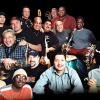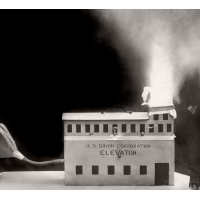Home » Jazz Articles » Interview » A Fireside Chat with Jose Rizo
A Fireside Chat with Jose Rizo
It started from live sessions that I was doing on the air... [and] has gone beyond my wildest dreams.
—Jose Rizo on Jazz on the Latin Side
 The accessibility of Latin jazz, athough threatening to purists, supports improvised music in neighborhoods that otherwise would be ignored. This unassuming community celebration affords Latin jazz with its sustained success. Jose Rizo has played a pivotal role in the music's maturation and prosperity. Chronicling its progression on the radio, Rizo (unedited and in his own words) has transcended his narrative to continuing Latin jazz's advancement.
The accessibility of Latin jazz, athough threatening to purists, supports improvised music in neighborhoods that otherwise would be ignored. This unassuming community celebration affords Latin jazz with its sustained success. Jose Rizo has played a pivotal role in the music's maturation and prosperity. Chronicling its progression on the radio, Rizo (unedited and in his own words) has transcended his narrative to continuing Latin jazz's advancement. All About Jazz: Let's start from the beginning.
Jose Rizo: When I was younger, I had an uncle that had a really interesting collection of albums by Tito Puente, Beny Moré, and then he would have albums of Glenn Miller. I always enjoyed listening to both. The combination was fun to listen to. That is where the seed was planted. I grew up in Oxnard and we listened to a lot of R&B and a lot of oldies. I grew up in the barrio in Oxnard and had a lowrider and cruised. Then I went to UC Santa Barbara and got involved with the station there. I wanted to have a weekly radio program. At first, I started interviewing people on the air. That was my show. Gradually, the amount of music I played increased and my interest in the music also increased. Eventually, I became program director there and always loved filling in on the jazz spots. I looked forward to it because I could just pull out the whole Coltrane collection and get into Coltrane one night or into Miles or Yusef Lateef.
AAJ: How did you begin at KLON?
JR: I was doing radio at KCSB in Santa Barbara and I met Poncho there. I would always hang out with him when he traveled there with Cal Tjader. We became friends. I was deep into the music there and that really affected my studies. I am an electrical engineering major and when my son was born, I thought that this music was taking too much of my time and stopped it cold. I moved out here to L.A. and I was living in East L.A. and Poncho would call up and say that he was playing and if I wanted to hang out and we would. He would always ask me when I was getting back into radio. I would listen to KLON. It was Poncho's favorite and he turned me onto it. One day, it just hit me and I wanted to get back into radio. So I called Ken Borgers, who was the program director at that time, and I told him that I was interested in doing a show there. He let me come in and do a demo on a Saturday. At that time, people didn't know about Chucho Valdés and Gonzalo Rubalcaba and Arturo Sandoval and I was deep into that music. Two days later, he called me up and asked where I got that stuff from and he was impressed and he said that he wanted me on KLON. I said that I was good friends with Poncho and he called him up and Poncho recommended me and the rest is history.
AAJ: Did you envision Latin jazz getting as popular as it has in this country?
 JR: No, when I started, there were no other Latin jazz shows.
JR: No, when I started, there were no other Latin jazz shows.
AAJ: Because while Southern California has a sizeable Latin population, the music itself transcends color lines.
JR: When I first came on KLON, the first membership drive, I think they thought I would bring in a Latin audience. But to their surprise and mine also, there was hardly any Latin pledges. It does cross all cultures. It is a music that is enjoyed by everyone.
AAJ: What is the secret to its success?
JR: The combination is just infectious, the melodies, the jazz harmonies with the Afro-Cuban drumming, that combination hits our primal spots and it excites us and we enjoy it. Latin jazz touches a lot of cultures. I look at it as a plate of great food with two elements on it, straight-up jazz and Latin percussion. If you like more salsa and more Latin, you listen to Tito Puente and Poncho Sanchez. If you don't like much of the spice, you listen to the things Sonny Rollins did with Candido. All of it is Latin jazz in my mind.
AAJ: How did Jazz on the Latin Side go from a radio program to a band?
 JR: It had a life of its own, building into that. It started from live sessions that I was doing on the air. I enjoyed bringing in musicians to the studio and having them play live music. One session I had was with the Estrada Brothers and Justo Almario and Mongo Santamaria walked in. That was the beginning of the Jazz on the Latin Side All-Stars. On the tenth anniversary, I wanted to do something special on the air. So I invited Poncho and all these other musicians and had a live jam session. That is how the Jazz on the Latin Side All-Stars came out. All these musicians wouldn't fit in the club, so we set it up at B.B. King and we made it a fundraiser. To our surprise, it sold out two weeks before. After the show, the music was so incredible, the musicians said that we should do more of it. It has gone beyond my wildest dreams.
JR: It had a life of its own, building into that. It started from live sessions that I was doing on the air. I enjoyed bringing in musicians to the studio and having them play live music. One session I had was with the Estrada Brothers and Justo Almario and Mongo Santamaria walked in. That was the beginning of the Jazz on the Latin Side All-Stars. On the tenth anniversary, I wanted to do something special on the air. So I invited Poncho and all these other musicians and had a live jam session. That is how the Jazz on the Latin Side All-Stars came out. All these musicians wouldn't fit in the club, so we set it up at B.B. King and we made it a fundraiser. To our surprise, it sold out two weeks before. After the show, the music was so incredible, the musicians said that we should do more of it. It has gone beyond my wildest dreams.
AAJ: Who are the current All- Stars?
JR: After that gig, I started getting getting calls. We've been together four years now. So now, the core is Francisco Aguabella, Alex Acuna, Justo Almario, Rene Camacho, Donald Vega, Danilo Lozano, Freddie Crespo, Robert Incelli, Scott Martin, Ramon Flores, Sal Cracchiolo, and Eric Gonzalez.
Visit Jazz on the Latin Side at KJAZZ .
Tags
About Jose Rizo
Instrument: Band / ensemble / orchestra
PREVIOUS / NEXT
Support All About Jazz
 All About Jazz has been a pillar of jazz since 1995, championing it as an art form and, more importantly, supporting the musicians who make it. Our enduring commitment has made "AAJ" one of the most culturally important websites of its kind, read by hundreds of thousands of fans, musicians and industry figures every month.
All About Jazz has been a pillar of jazz since 1995, championing it as an art form and, more importantly, supporting the musicians who make it. Our enduring commitment has made "AAJ" one of the most culturally important websites of its kind, read by hundreds of thousands of fans, musicians and industry figures every month.






















